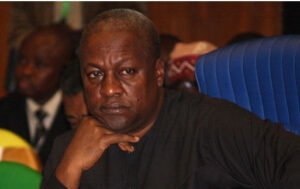
Prince Adjei (Guy Gee)
The Supreme Court of Ghana recently delivered a unanimous verdict in a case filed by a private citizen, seeking interpretation of article 102 and 104(1) of the 1992 constitution.
As part of the reliefs sought, Professor Justice Abdulai prayed the apex court of the land to, per article 102 and 104(1), declare that a Deputy Speaker, while presiding, cannot be counted as a Member of Parliament present, should not have the power to vote and where the voting had already taken place as was in the case of the approval of the 2022 annual budget, the approval should be nullified.
In a 7-0 unanimous decision, the Supreme Court ruled that a Deputy Speaker could be counted and must be allowed to vote even while presiding.
The court therefore upheld the proceedings that led to the approval of the 2022 budget in which the 1st Deputy Speaker was counted as a Member of Parliament while presiding, thus satisfying the requirement for a quorum.
The reactions following the judgement have been mixed with opinions sharply divided as usual.
While many have commended the apex court for bringing clarity on a matter which seems to have disturbed the peace and serenity of parliament, others hold the view that the judgement of the Supreme Court was in error and have expressed the desire to push for a review of the ruling.
Opinion/opposition
Many, including not just lawyers, but, also members of civil society organisations, institutions, political activists and even ordinary Ghanaians have shared their opinions on the decision of the court.
Vociferous among the many are the National Democratic Congress members of Parliament and their supporters who have so far questioned the ruling.
The NDC and its apparatchiks hold the view that parliament is a master of its own rules and procedures, as such exercising judicial decision on it by the court amounts to interference.
The Speaker of Parliament, Rt. Hon. Alban Bagbin, a leading figure of the NDC in expressing his view described the ruling as an absurdity and intrusion into the remit of the legislature.
Perhaps, what he and other people who think like him fail to recognise is that, all bodies and democratic structures in the country are subject to the laws of Ghana as well as the constitution and for this reason cannot purport to have immunity against the jurisdiction of the Supreme Court.
The position of the NDC is very surprising and untenable not because it assumes a differing opinion on the judgement of the apex court, but its failure to steep its arguments in law.
Reprobate/approbate
One would have thought that the NDC would have hasten slowly in their condemnation of the Supreme Court since they are the first to sing the praise of same anytime a ruling had gone in their favour.
While they applaud the judiciary whenever a judgement goes in their favour, they are quick to launch scathing attacks at the courts debasing the very bastion of our democracy, thus creating a very serious subculture that could destroy the society.
It is rather surprising that a political party like the NDC that should know better would seek to reprobate and approbate at the same time.
It is instructive to note that on February 15, 2022, the Speaker Alban Bagbin made it clear on the floor of Parliament his support for the course of interpretation of article 102 and 104 (a) by a private citizen at the Supreme Court.
In pursuance to this, he explicitly asked members of Parliament to stand in readiness to be guided by whatever clarification the court may come out with. It is therefore worrying that the same person would begin to question the rationale behind the ruling of the court.
Even though Bagbin like any other Ghanaian has a right to expound his or her opinion on rulings of the court, much is expected of him due to the position he occupies and the fact that he is a lawyer of long standing.
To enrich the country’s democratic structures, it is expected when individuals who are lawyers decide to challenge any ruling from a court, their arguments would be steeped in law rather than emotions.
Double standards
Guarding against double standards on issues of national interest remains the surest way of building stronger institutions and it is imperative to emphasise that stronger institutions remain the bed rock for any thriving democracy.
Not long ago the NDC while in power in 2013, extolled the virtues of the Supreme Court for its judgement on August 8, which declared President John Mahama then as the legitimately elected President in the 2012 general elections.
Even though, the then opposition New Patriotic Party (NPP) disagreed with the verdict, it graciously accepted the verdict without attacking the Supreme Court.
Under rather some bizarre circumstances, the NDC which was a major beneficiary of the same court’s ruling in 2013, decided to attack the court for its judgement in 2021. The sad aspect of this posture was the fact that the NDC’s attacks were not based on any legal argument let alone talk about sound legal arguments.
The essence of the private citizen, Justice Abdulahi, going to the Supreme Court to invoke its interpretive jurisdiction was not just for academic purposes but also help cure the disgraceful and barbaric phenomenon of MPs using fisticuffs in settling matters of law on the floor of the House.
One would have thought that the Supreme Court would rather have received plaudits for living up to its democratic tenets and where one has a problem with the ruling canvass stronger legal arguments to show why the seven-member panel was wrong.
Deriding democracy
Rather, the NDC have resorted to vitriolic attacks, mudslinging and name calling all intended to deride the very bastion of our democracy.
The question that arises is that, If the NDC truly believe in the will of the people, why would it assume a stance seeking to deprive any group of people of their representation by preventing their members of Parliament from voting simply because he or she has been given additional responsibility of a Deputy Speaker who presides over a deliberation which does not require his or her independent opinion?
Does an MP cease to perform the constitutional duty his people have imposed on him or her to participate in all the national assignments executed in Parliament just because of that additional responsibility?
The country risks destroying the gains it has made with its democratic development so far unless and until individuals who have had the privilege of rising to the top echelons of leadership act in a very responsible manner by learning to respect institutions of state whether in office or out of office.
In the 2012 presidential election petition filed by the then candidate Akufo-Addo et al, the Supreme Court after almost eight (8) months of proceedings, declared Mr. John Mahama the winner. In that circumstance, he, his vice, the late Paa Kwesi Amissah Arthur and then Chief of Staff, Julius Debrah went on a jubilant spree at the Jubilee House.
Additionally, he and his party held a press conference to shower praises on the Supreme Court for that historic verdict. At that time, they saw the Supreme Court as sanctimonious institution.
However, the same personality is today lambasting the same court for its ruling on the rights of Deputy Speakers.
Democratic principles
It is important for the people to let our leaders know that remaining resolute and consistent was the surest way to help strengthen democratic principles thus, blowing hot and cold will only seek to a jeopardise our democratic governance.
We should all help to put Ghana first by eschewing tendencies that have the potential to cause judicial ventriloquism as this could undermine the very democratic institutions we aspire to build.
The same laws and rulings denigrated today, could be the saviour of tomorrow’s conundrum. Everyone is at liberty to critique the judiciary and their decisions, but in doing so, attempts should not be made to undermine its sanctity.







